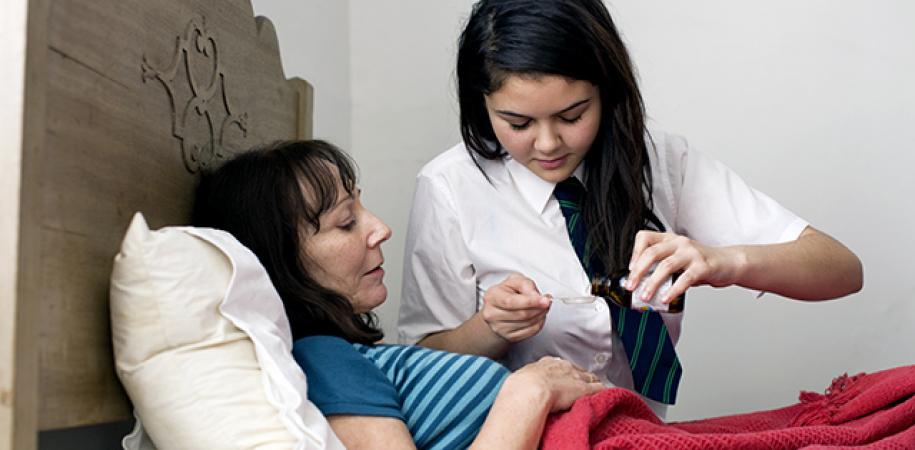Identifying and Supporting Young Carers
Professional development for multi-disciplinary audiences in Brent, Harrow and Hillingdon
Health Education England (HEE) is collaborating with the Councils and CCGs of Brent, Harrow and Hillingdon, on an ambitious project to meet the needs of Young Carers.
Our Vision
Supporting Young Carers to be happy, healthy and successful, from the moment they start caring until they transition to adulthood, by working together.
Values:
- Young Carers are children first: they will be protected from excessive or inappropriate caring responsibility.
- Caring is an incredibly important service; to those cared for and to society in general. Young Carers should always be made to feel valued for what they do.
- Identifying and supporting Young Carers is the responsibility of all organisations in contact with them, or their families.
How you can help
We are targeting professional development at any and all professionals who work with:
- People in need of care (i.e. disabled, ill, or substance misusers)
- Children and Young People (some of whom may be young carers)
Please help us achieve our vision for Young Carers by:
1) Completing the Survey of Professionals:
2) Signing up to scheduled training sessions in your borough (April-June 2017):
- Brent (details coming soon)
- Harrow (details coming soon)
- Hillingdon (details coming soon)
3) Helping us to recruit Young Adult Carers to become co-trainers- click here for more information
4) Making systemic changes in your organisation, using the following guidance:
a) Supporting young carers and their families: for health care professionals
b) Supporting children who have a parent with a mental illness: for professionals
5) Contacting us if you wish to discuss other learning and development approaches or opportunities.
Contact Details:
For most queries, please contact :
Charisse Monero: Charisse.Monero@harrow.gov.uk
Contact: 020 8424 7602
Borough based queries of a more complicated or strategic nature can also be directed to the following Borough Leads:
Brent: Patricia.Whelan-Moss@nhs.net
Harrow: Charisse.Monero@harrow.gov.uk
Hillingdon: Judith.Mace1@nhs.net
Frequently asked Questions
Who is a Young Carer?
A child or young person aged under 18 who provides regular or on-going care and emotional support to a family member who is:
-
- physically ill
- mentally ill
- disabled
- misuses substances
For more information about Young Carers click here
What will the learning approach be?
The training will be around two hours long (some sessions may be shorter if necessary to capture all professional groups). It will be undertaken in multi-professional groups to enable peer learning across professional boundaries. Young Adult Carers will be helping to deliver the training and telling their story.
What are the aims?
We want to ensure that Young Carers are:
- Identified, by everyone, in all relevant organisations.
- Supported by the services that help those cared for.
- Assessed to determine their needs and level of responsibility.
- Referred to and access the support they need:
- Healthier, happier and have better life chances.
- Feel more informed about the health conditions of those they care for
Where can I find out more about support and provision for Young Carers in my borough?
The best way to do this is to attend one of the training sessions. If you need information more immediately, this can be found below:
Why focus on Young Carers?
- 1 in 12 secondary aged children is thought to be a carer
- 10 is the average age when young carers start caring. Some are much younger.
- Most young carers are hidden and unsupported.
Young Carers are more likely to:
- Suffer from poor physical and mental health.
- Miss or underperform at school, be bullied, and miss out on leisure opportunities.
- Be not in education, employment or training.
Is there any e-learning available?
For e-learning options and other resources, please see here:
You will get more out of the face-to-face training if you complete the e-learning first. However, you will get much more from the face-to-face training than the e-learning, so if you can only do one, please attend a learning session in person.
I would like to be involved but my work commitments mean it is difficult for me to attend the training, what should I do?
Please contact Edward Smith to discuss options and any ideas that you may have.
Is there a leaflet about this project that I can share with colleagues and other professionals?
The Leaflet can be found by clicking here. If there are limits on the number of people who can attend face-to-face training from your organisation, please encourage your colleagues to complete the e-learning.
How is this project funded?
We are grateful to Health Education England, North West London for funding this important work through their ˜Partnerships in Innovative Education (PIE) programme.


